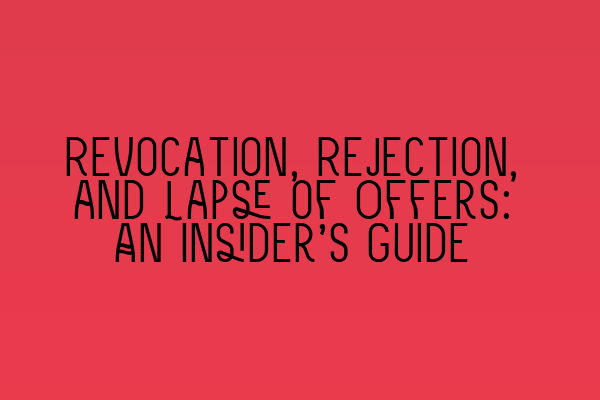Revocation, Rejection, and Lapse of Offers: An Insider’s Guide
Welcome to SQE Contract Law! As a solicitor, it is my pleasure to provide you with an insider’s guide to understanding the concepts of revocation, rejection, and lapse of offers in contract law. In this blog post, we will explore the intricacies of these topics and their implications in legal transactions. So grab a cup of coffee and let’s dive in!
Revocation of Offers:
Revocation refers to the act of withdrawing or canceling an offer. In contract law, an offer can be revoked by the offeror at any time before it is accepted by the offeree. This means that the offeror has the power to change their mind and withdraw the offer without any legal consequences.
However, there are certain conditions that need to be met for a valid revocation. First, the offeror must communicate the revocation to the offeree. A mere change of mind without proper communication will not be considered a valid revocation. Second, the revocation must be received by the offeree before they have accepted the offer. Once the offeree has accepted the offer, the revocation will no longer be effective.
Rejection of Offers:
In contrast to revocation, rejection occurs when the offeree refuses to accept the offer. This can be communicated explicitly through words or actions that clearly indicate the offeree’s unwillingness to enter into a contract based on the offer. Once an offer is rejected, it is considered terminated, and the offeree cannot later decide to accept it.
It is important to note that a rejection of an offer does not automatically terminate the offeror’s ability to make a subsequent offer. The offeror can still choose to make a new offer or modify the existing one. However, it’s crucial to understand that the terms of the new offer might differ from the original offer, and the offeree can negotiate the terms before acceptance.
Lapse of Offers:
The lapse of an offer occurs when a valid offer is terminated due to the expiration of a specified time period or the occurrence of a specified event. If an offer does not specify a time period for acceptance, it will lapse after a reasonable amount of time has passed. What constitutes a reasonable amount of time depends on various factors, such as the nature of the contract and the circumstances surrounding the offer.
Additionally, an offer can lapse if the offeror dies or becomes incapacitated before the offer is accepted. In such cases, the offer becomes null and void, and the offeree cannot accept it.
Conclusion:
Understanding the concepts of revocation, rejection, and lapse of offers is vital in ensuring efficient and compliant legal transactions. As a solicitor, it is crucial to be aware of the legal intricacies involved in contract law to provide accurate advice and guidance to clients.
If you found this article helpful, you may also be interested in reading our other related articles:
– Mentorship for Aspiring Solicitors: Nurturing Talent in the Legal Field
– Legal Challenges and Pitfalls: Navigating the Complexities of the Legal System
– Demystifying the Solicitors Qualifying Examination (SQE): What You Need to Know
– Recognizing Excellence: Law Industry Awards and Accolades
– Mentorship for Aspiring Solicitors: Finding Guidance on Your Legal Journey
Thank you for reading this blog post. If you have any further questions or require legal assistance, please do not hesitate to contact SQE Contract Law. Stay tuned for more informative articles on contract law and other legal topics!
